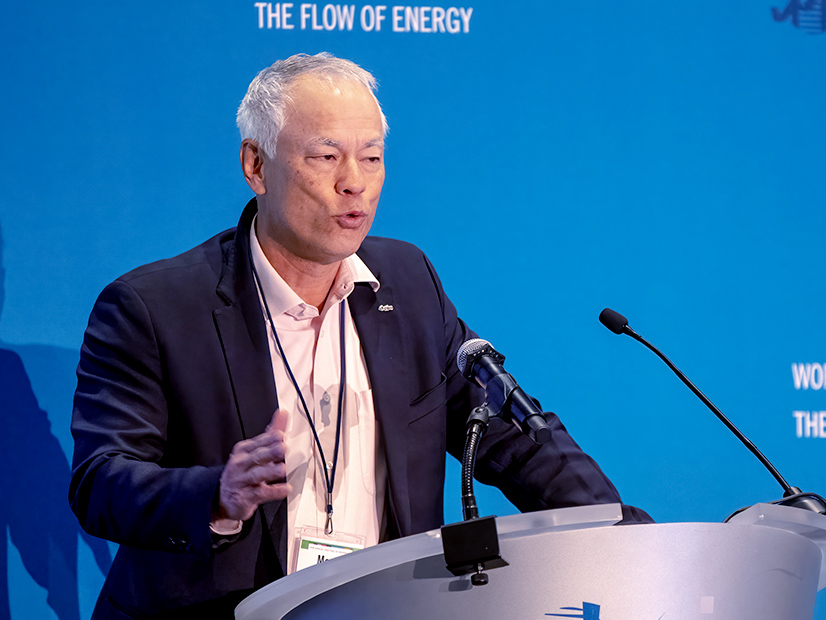BALTIMORE, Md. — The PJM Members Committee on May 6 rejected endorsement of revisions to the RTO’s Operating Agreement and tariff shifting filing rights over the Regional Transmission Expansion Plan (RTEP) from the committee to the Board of Managers.
The language received 25% sector-weighted support during PJM’s Annual Meeting, held this year at the Baltimore Marriott Waterfront hotel.
The proposal was brought to the MC by the PJM Board of Managers in response to similar revisions to the Consolidated Transmission Owners Agreement (CTOA) brought to the Transmission Owners Agreement-Administrative Committee (TOA-AC). The TOA-AC also is set to consider revising the CTOA on May 14. Should the CTOA be modified, modifications to the PJM OA and Tariff would be necessary to avoid inconsistency.
The vote does not necessarily prohibit the board from unilaterally filing a proposal with FERC. PJM Director of Stakeholder Affairs Dave Anders said the board sought the input of stakeholders on the changes prior to considering whether to agree to any CTOA amendments that the TOA-AC may request.
During the April 25 Markets and Reliability Committee meeting, PJM General Counsel Chris O’Hara said the board has not ruled out making a Federal Power Act Section 206 filing asking FERC to grant it filing rights over the RTEP protocol if TOA-AC approves the CTOA revisions and the MC does not endorse the companion OA and Tariff revisions.
. At the Annual Meeting, board Chair Mark Takahashi stressed that no decisions had been made and that the board values the stakeholder process. There may be some cases, however, where the membership reaches a stalemate and the process cannot yield a solution to an issue that needs resolving, he said.
Several stakeholders argued they had only weeks to consider the changes, leaving insufficient time to vet the language for unintended consequences or to provide thoughtful comments.
Paul Sotkiewicz, president of E-cubed Policy Associates, said transferring the planning to the Tariff from the OA, in the context of the planning reforms in the table, would lead back to integrated resource plans.
Susan Bruce, of the PJM Industrial Customers Coalition, said the key difference with the RTO holding filing rights is that overriding an MC vote currently requires a filing under FPA Section 206, which must demonstrate that the existing governing document language is unjust and unreasonable.
“We strongly believe in the stakeholder process. The PJM stakeholder process has been important in balancing parties’ rights in this industry that has gone through a lot of transitions,” she said, adding that stakeholders have not had adequate time to think through the proposal.
LS Power’s Sharon Segner argued that any MC votes to amend the OA must immediately result in a FERC filing, but the drafted CTOA language includes a mediation process for any instances where a TO objects to an MC vote that it feels is contrary to the agreement. She said the interactions between that provision and the proposed OA and tariff language are not understood.
The status quo governing document language strikes a balance between granting TOs filing authority over local planning decisions, while PJM membership holds filing authority over regional planning.
Exelon’s Alex Stern said the PJM Members Committee is not a FERC jurisdictional public utility. It is a body created for consultation and does not have regional planning authority — that burden lies with PJM, which should hold final say over planning decisions. Stern asserted that “the Planning Protocol was directed to be placed in the OA by FERC nearly two decades ago to afford PJM independence. Unfortunately, as things have evolved, that intention has been thwarted to the point that people now actually incorrectly believe the Members Committee and not PJM has the regional planning authority.”
He said TOs, as PJM members, also are giving up stakeholder process veto rights over the planning protocols, but supporters of the CTOA revisions believe changes are needed to ensure reliability through the clean energy transition and to meet rising load, noting the growing reliability challenges facing PJM, highlighted by last week’s announcement that the summer outlook PJM presented to the Operating Committee on May 2 stated there’s a smaller generation pool available this summer than past years while forecast peak loads are increasing. (See related story, “PJM Confident on Summer Reserves; Stakeholders Concerned About Long Term,” PJM Operating Committee Briefs: May 2, 2024.)




